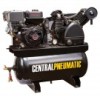Harbor Freight Tools 62779 User Manual - Page 4
Save These Instructions.
 |
View all Harbor Freight Tools 62779 manuals
Add to My Manuals
Save this manual to your list of manuals |
Page 4 highlights
Safety Setup 23. WARNING: The brass components of this product contain lead, a chemical known to the State of California to cause cancer and birth defects or other reproductive harm. (California Health & Safety Code § 25249.5, et seq.) 24. When spills of fuel or oil occur, they must be cleaned up immediately. Dispose of fluids and cleaning materials as per any local, state, or federal codes and regulations. Store oil rags in a bottom-ventilated, covered, metal container. 25. Keep hands and feet away from moving parts. Do not reach over or across equipment while operating. 26. Before use, check for misalignment or binding of moving parts, breakage of parts, and any other condition that may affect the equipment's operation. If damaged, have the equipment serviced before using. Many accidents are caused by poorly maintained equipment. 27. Use the correct equipment for the application. Do not modify the equipment and do not use the equipment for a purpose for which it is not intended. Service Precautions 1. Before service, maintenance, or cleaning: a. Turn the engine switch to its "OFF" position. b. Allow the engine to completely cool. c. Then, remove the spark plug cap from the spark plug. 2. Keep all safety guards in place and in proper working order. Safety guards include muffler, air cleaner, mechanical guards, and heat shields, among other guards. 3. Do not alter or adjust any part of the equipment or its engine that is sealed by the manufacturer or distributor. Only a qualified service technician may adjust parts that may increase or decrease governed engine speed. 4. Wear ANSI-approved safety goggles, heavy-duty work gloves, and dust mask/respirator during service. 5. Maintain labels and nameplates on the equipment. These carry important information. If unreadable or missing, contact Harbor Freight Tools for a replacement. 6. Have the equipment serviced by a qualified repair person using only identical replacement parts. This will ensure that the safety of the equipment is maintained. Do not attempt any service or maintenance procedures not explained in this manual or any procedures that you are uncertain about your ability to perform safely or correctly. 7. Store equipment out of the reach of children. 8. Follow scheduled engine and equipment maintenance. Air Compressor Safety Warnings 1. Risk of fire or explosion - Do not spray flammable liquid in a confined area or towards a hot surface. Spray area must be well-ventilated. Do not smoke while spraying or spray where spark or flame is present. Arcing parts - Keep compressor at least 20 feet away from explosive vapors, such as when spraying with a spray gun. 2. Risk of bursting - Do not adjust regulator higher than maximum stated pressure of attachment. 3. Risk of injury - Do not direct air stream at people or animals. 4. Do not use to supply breathing air. 5. Do not use the air hose to move the compressor. 6. Drain Tank daily and after use. Internal rust causes tank failure and explosion. 7. Add correct amount of compressor oil before first use and every use. Operating with the incorrect amount of oil causes permanent damage and voids warranty. To prevent damage, do not use with overfilled or low oil. 8. Compressor head gets hot during operation. Do not touch it or allow children nearby during or immediately following operation. 9. Release the pressure in the storage tank before moving. 10. The use of accessories or attachments not recommended by the manufacturer may result in a risk of injury to persons. 11. All air line components, including hoses, pipe, connectors, filters, etc., must be rated for a minimum working pressure of 125 PSI, or 150% of the maximum system pressure, whichever is greater. SAVE THESE INSTRUCTIONS. Operation Maintenance Page 4 For technical questions, please call 1-888-866-5797. ITEM 62779













